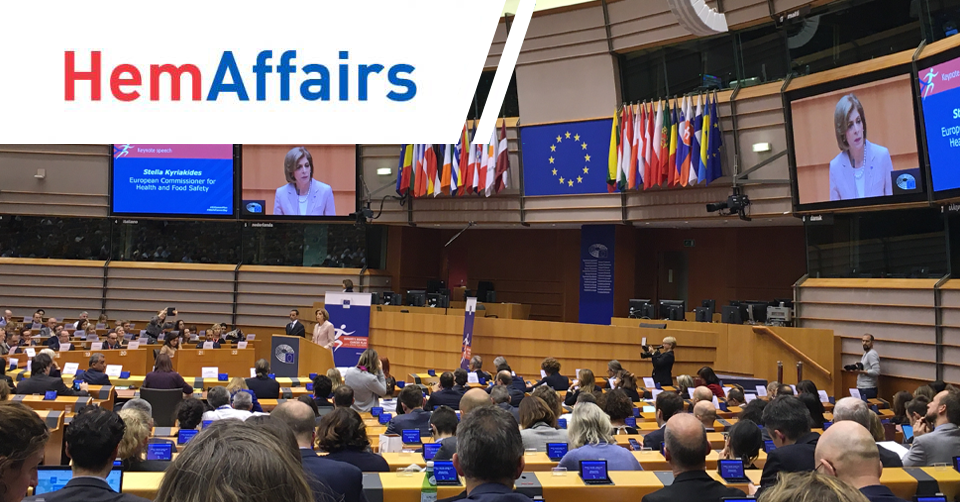This information originally appeared on the previous EHA website. Links to other pages may be inactive.

Over the past decades, the European Union (EU) has become more involved in public health policy. A recent study showed that a majority of policymakers even identifies EU health policy as a priority for 2020-20241.
In principle, Member States are in charge of health services and medical care. The Union only supports, supplements and complements national policies in areas in which Union level action is preferable (e.g. cross-border healthcare and harmonization measures setting high quality and safety standards). This principle is called subsidiarity. That being said, the added value achieved through collaborative, cross-border healthcare has increased, owing to the free movement of people between Member States and technological innovation.
A brief history of EU public health policy
In the early days, European legislation contained no explicit references to health policy. It was seen as a national responsibility. Besides, Member States already had their own distinct healthcare systems. As European integration gradually increased, the need for harmonization in health policy grew. Eventually, in 1985, the Schengen Agreement that enabled people to freely travel to and work in different Member States sped up the process. As of 1993, the EU became more involved in public health policy and adopted eight action programs in various areas2. In 2007 the Lisbon Treaty entered into force, enhancing the importance of health policy and formulating three principles that still hold today:
- To protect and improve the health of EU citizens;
- To support the modernization of health infrastructure;
- To improve the efficiency of Europe's health systems.
Has the EU been effective in health policy?
The EU has made important contributions to healthcare in some areas. For example, it has invested billions in research and innovation with Horizon 2020 (€30 bln) and the Innovative Medicines Initiative (€2 bln). It plays a major role in advancing access to, and the development of, orphan drugs through pan-European cooperation on health technology assessments (HTA). Also, thanks to European efforts, there is an EU-wide database for rare diseases that contributes to the effective treatment of thousands of patients.
On other issues, the EU has been less successful. Take for example the Clinical Trials Directive, which has added complexity and bureaucracy. The EU also failed to come up with a Union-wide system for the bulk procurement of medicines and vaccines to reduce costs.
In short, the EU has been effective in some health policy areas whilst much work remains to be done in others. In light of the subsidiarity principle Member States remain responsible for the definition of their health policies. As a result, the threshold to developing and implementing (any) EU public health policy continues to be high. And yet, recent research by the European Commission and the European Parliament3 has demonstrated the added value of Union-level health policy and cooperation in various areas.
What’s next?
The new Health Commissioner Stella Kyriakidès has announced the ‘Europe’s Beating Cancer Plan’, a broad approach to challenges concerning cancer. In an exchange of views with Members of the European Parliament on February 18, she outlined its key priorities and actions. Among others:
• Access to medicines: The European Commission sees access to medicine as the top priority, and will support Member States in finding solutions for the affordability and sustainability challenges arising from high prices.
• Doing more on rare diseases and orphan drugs: The Commission echoes the request by MEPs to step up support for research on rare diseases, and to foster equal access to orphan medicines across the EU. DG SANTE is currently working on recommendations as part of an evaluation of the orphan and pediatric legislation.
• Funding the Cancer Plan: The EU is mobilizing funds available through the next Framework Programme for Research & Innovation, Horizon Europe (e.g. the Cancer Mission), but also through the European Social Fund and the European Digital Fund, to mention a few.
The European Commission is still looking for input; stakeholders have until May 7, 2020 to provide their views on the EU Cancer Plan via the online public consultation.
1 “How to keep the EU health care affordable”, updated October 2019, POLITICO
2 These action programs focused on health promotion, information, education and training; on an action plan to combat cancer; on the prevention of AIDS and certain other communicable diseases; on the prevention of drug dependence; on health monitoring; on injury prevention; on rare diseases; and on pollution-related diseases.
3 ‘The benefit of EU action in health policy: The record to data’, 8 March 2019.